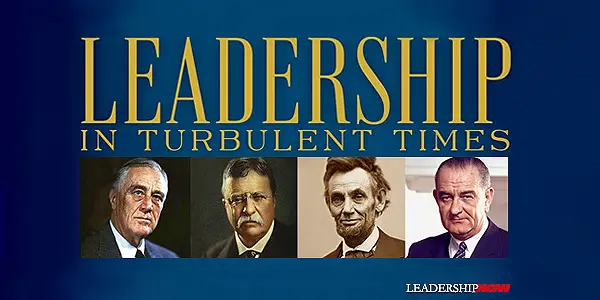 |
 |
10.08.18

Leadership in Turbulent Times
D In this well-structured study, she begins by looking at the lives of each leader in turn, when they first entered public life. Unremarkable at this stage of their life they, like most young leaders, made mistakes stemming from inexperience, cockiness, lack of caution, outright misjudgments, and selfishness.” But more importantly we “see the efforts made to acknowledge, conceal, or overcome these mistakes.” This, of course, is a key to their eventual success. For all of the differences in personality, temperament, and background, that separated them they were united “by a fierce ambition, an inordinate drive to succeed. With perseverance and hard work, they all essentially made themselves leaders by enhancing and developing the qualities they were given.” By the time these men were 30 they had developed the stuff of leadership. In Part Two, these leader’s lives again align when forced to deal with tragedy and setbacks that threatened their identity and end their prospects. Their adversities, though unique to each, cast doubt on who they were. “Abraham Lincoln suffered a blow to his public reputation and his private sense of honor that led to a near-suicidal depression; Theodore Roosevelt lost his young wife and his mother on the same day; Franklin Roosevelt was struck by polio and left permanently paralyzed from the waist down; Lyndon Johnson lost an election to the United States Senate.” These events became crucibles in their lives that deepened and redefined their leadership approaches. Abigail Adams wrote her son, John Quincy Adams, “It is not in the still calm of life, or the repose of a pacific station, that great characters are formed. The habits of a vigorous mind are formed in contending with difficulties. Great necessities call out great virtues.” How they responded to their reversals provides lessons for us all. They allowed these experiences to shape and mature them into leaders that would make a mark on their times. It is the lessons that each learned that they took to the White House. In Part Three we see how each dealt with the turbulent issues of their day. One might observe too that although we see our times as the worst of times because we are so close it, many periods of our own history had far more in the balance. Goodwin looks at how each leader applied their unique leadership composition to the crisis of the day. Lincoln’s decision to issue the Emancipation Proclamation did not come easily. His transformational and his transactional leadership made it possible. He combined the two. “For Lincoln, pragmatic, transactional strategies provided the nuts and bolts of principled, transformational leadership.” Theodore Roosevelt came into office after the assassination of President William McKinley. Shortly thereafter, he faced a national crisis—The Great Coal Strike of 1902. As the fall approached the six-month-old strike was not any closer to resolution and a widespread panic set in. There was no precedent or legal course of action that allowed presidential intervention. But he did. How he brought the parties together and eventually found a solution provides a blueprint for crisis management. The Great Depression was in full swing and unemployment had reached 25 percent when Franklin Roosevelt came into office. Indeed, he thought that “the whole house of cards” might collapse before he had a chance to be sworn in. But “the steps Roosevelt took during the next hundred days to stem the immediate banking crisis set in motion a turnaround that would forever alter the relationship between the government and the people.” It’s an engaging case study in turnaround leadership. Next, Goodwin turns to the visionary leadership of Lyndon Johnson. Assuming he presidency after the assassination of John Kennedy, he quickly assured the public and showed deference to Kennedy’s inner circle. “Checking his storied arrogance, softening his tone, he conveyed a deep humility, sharing his doubts, continuously requesting patience, advice, and assistance.” Johnson had a vision for a Great Society that he was able to actualize by making a dramatic start, leading with his strengths, simplifying the agenda, establishing an effective order of battle, honoring commitments, continual drive, and by mastering the narrative. While each was different, what serves each of these leaders is their understanding of human nature. Lincoln brought a team of rivals together because of his “empathy, humility, consistency, self-awareness, self-discipline, and generosity of spirit.” As was expressed by Theodore Roosevelt in his autobiography, Leaders “need more than anything else to know human nature, to know the needs of the human soul.” Goodwin writes, “At the core of Johnson’s success in the Senate was his celebrated ability to read character, to gauge the desires, needs, hopes, and ambitions of every individual with whom he interacted.” All four of these leaders hoped that they had made a difference. Goodwin turns to their legacy in Part Four. Unfortunately, Lincoln and FDR would die in office. TR and LBJ would have to deal with the “aftermath of leadership.” TR to his dying day wish to run for president. Living four years beyond his presidency, LBJ knew, “with a consuming sadness, that his days of active leadership had come to an end.” The lessons contained in these lives should guide us now in our own turbulent times. Of Related Interest:

Posted by Michael McKinney at 03:56 PM
|
BUILD YOUR KNOWLEDGE
 

How to Do Your Start-Up Right STRAIGHT TALK FOR START-UPS 
Grow Your Leadership Skills NEW AND UPCOMING LEADERSHIP BOOKS 
Leadership Minute BITE-SIZE CONCEPTS YOU CAN CHEW ON 
Classic Leadership Books BOOKS TO READ BEFORE YOU LEAD |